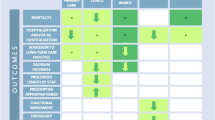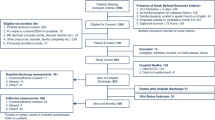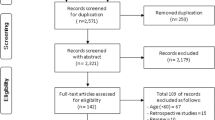Abstract
Background
Frailty, at the core of geriatric medicine, is an important concept underpinning health problems but the rapid and valid measurement of frailty for older adults in the Emergency Department (ED) is lacking in China. The Frailty Screening Questionnaire (FSQ), has been shown to be a simple, rapid and practical tool to identify frailty in both community and inpatients settings, yet its utility in acute care settings is not well understood.
Objective
To determine whether FSQ is useful to identify frailty and predict adverse outcomes in an emergency care setting.
Design and Participants
This prospective study included 350 adults aged 60 and over and admitted to the ED.
Measurements
The FSQ questionnaire which assessed self-reported slowness, weakness, inactivity, exhaustion, and weight loss was used to rapidly recognize frailty. FRAIL, Clinical frailty score (CFS), activities of daily living (ADL) and nutrition risk screening 2002 were also assessed. Outcome measures included all-cause 28-day mortality, ADL dependency, mechanical ventilation, length of hospital stay, and ICU readmissions 30 and 90 days after discharge. Cox proportional hazard model was used for survival comparison.
Results
The prevalence of FSQ frailty and prefrailty in older adults were 44.6% and 30.9% respectively in the emergency setting. FSQ frailty was associated with increasing age, chronic diseases, malnutrition risk, poor physical function and worse outcomes indicated by higher 28-d mortality, ADL dependency, mechanical ventilation, length of hospital stay, and ICU readmissions after discharge. The Kappa coefficient between the FSQ and FRAIL was 0.552. FSQ score was negatively correlated with grip strength and positively correlated with Barthel index, length of hospital stay and CFS score. Cox regression adjusted by epidemiological variables and chronic diseases showed FSQ and all components predicted mortality except weight loss.
Conclusion
The FSQ is a rapid and useful tool to screen frailty and an effective tool to predict mortality in busy emergency settings.


Similar content being viewed by others
References
World Population Prospects — Population Division — United Nations. https://population.un.org/wpp/. Accessed August 2, 2019.
Yao JL, Fang J, Lou QQ, Anderson RM. A systematic review of the identification of seniors at risk (ISAR) tool for the prediction of adverse outcome in elderly patients seen in the emergency department. Int J Clin Exp Med. 2018;8(4):4778–4786.
Cousins G, Bennett Z, Dillon G, Smith SM, Galvin R. Adverse outcomes in older adults attending emergency department: Systematic review and meta-analysis of the Triage Risk Stratification Tool. Eur J Emerg Med. 2013;20(4):230–239. doi:https://doi.org/10.1097/MEJ.0b013e3283606ba6
Carpenter CR, Shelton E, Fowler S, et al. Risk factors and screening instruments to predict adverse outcomes for undifferentiated older emergency department patients: a systematic review and meta-analysis. Acad Emerg Med. 2015;22(1):1–21. doi:https://doi.org/10.1111/acem.12569
Fried LP, Tangen CM, Walston J, et al. Frailty in Older Adults: Evidence for a Phenotype. Journals Gerontol Ser A Biol Sci Med Sci. 2001;56(3):M146–M157. doi:https://doi.org/10.1093/gerona/56.3.M146
Puig Campmany M, Ris Romeu J, Blázquez Andión M, Benito Vales S. Development of a comprehensive, multidisciplinary program of care for frailty in an emergency department. Eur Geriatr Med. 2019;10(1):37–46. doi:https://doi.org/10.1007/s41999-018-0151-2
Theou O, Squires E, Mallery K, et al. What do we know about frailty in the acute care setting? A scoping review. BMC Geriatr. 2018; 18(1): 139. doi:https://doi.org/10.1186/sl2877-018-0823-2
Ma L, Tang Z, Chan P, Walston JD. Novel Frailty Screening Questionnaire (FSQ) Predicts 8-Year Mortality in Older Adults in China. J Frailty Aging. 2019;8(1):33–38. doi:https://doi.org/10.14283/jfa.2018.38
Ma L, Tang Z, Chan P, Walston JD. Validation of a Self-reported Frailty Screening Tool in Chinese Older Population. J Am Geriatr Soc. 2018. doi:https://doi.org/10.1111/jgs.15550
Zhang Y, Zhang Y, Li Y, Chan P, Ma L. Reliability and validity of the self-reported frailty screening questionnaire in older adults. Ther Adv Chronic Dis. 2020;11:1–8. doi: https://doi.org/10.1177/2040622320904278
Wallis SJ, Wall J, Biram RWS, Romero-Ortuno R. Association of the clinical frailty scale with hospital outcomes. QJM. 2015;108(12):943–949. doi:https://doi.org/10.1093/qjmed/hcv066
Morley JE, Malmstrom TK, Miller DK. A simple frailty questionnaire (FRAIL) predicts outcomes in middle aged African Americans. J Nutr Heal Aging. 2012;16(7):601–608.
Zattoni D, Montroni I, Saur NM, et al. A Simple Screening Tool to Predict Outcomes in Older Adults Undergoing Emergency General Surgery. J Am Geriatr Soc. 2019;67(2):309–316. doi:https://doi.org/10.1111/jgs.15627
Lewis ET, Dent E, Alkhouri H, et al. Which frailty scale for patients admitted via Emergency Department? A cohort study. Arch Gerontol Geriatr. 2019;80:104–114. doi:https://doi.org/10.1016/j.archger.2018.11.002
Brousseau AA, Dent E, Hubbard R, et al. Identification of older adults with frailty in the Emergency Department using a frailty index: Results from a multinational study. Age Ageing. 2018;47(2):242–248. doi:https://doi.org/10.1093/ageing/afxl68
O’Caoimh R, Costello M, Small C, et al. Comparison of Frailty Screening Instruments in the Emergency Department. Int J Environ Res Public Health. 2019; 16(19). doi: https://doi.org/10.3390/ijerphl6193626
Hewitt J, Carter B, McCarthy K, et al. Frailty predicts mortality in all emergency surgical admissions regardless of age. An observational study. Age Ageing. 2019;48(3):388–394. doi:https://doi.org/10.1093/ageing/afy217
Khan M, Jehan F, Zeeshan M, et al. Failure to rescue after emergency general surgery in geriatric patients: does frailty matter? J Surg Res. 2019;233:397–402. doi:https://doi.org/10.1016/j.jss.2018.08.033
Ma L. Current Situation of Frailty Screening Tools for Older Adults. J Nutr Health Aging. 2019;23(1):111–118. doi: https://doi.org/10.1007/sl2603-018-1123-4
Kenig J, Zychiewicz B, Olszewska U, Barczynski M, Nowak W. Six screening instruments for frailty in older patients qualified for emergency abdominal surgery. Arch Gerontol Geriatr. 2015;61(3):437–442. doi:https://doi.org/10.1016/j.archger.2015.06.018
Elliott A, Hull L, Conroy S. Frailty identification in the emergency department—a systematic review focussing on feasibility. Age Ageing. 2017. https://academic.oup.com/ageing/article/2993057. Accessed June 12, 2017.
Acknowledgments
We acknowledge all the people who participated in the study. Dr. Lina Ma would like to express special thanks to Dr. Jeremy Walston from Johns Hopkins University School of Medicine for his guidance and support in completing the project.
Funding
Funding: This work was supported by Beijing Natural Science Foundation (7202059), Beijing Municipal Administration of Hospitals Incubating Program (PX2020036) and Milstein Medical Asian American Partnership Foundation Project Award in Geriatrics (2018).
Author information
Authors and Affiliations
Corresponding authors
Ethics declarations
Competing financial interests: The authors declare no competing financial interests.
Conflict of interest: None.
Ethical Standards: The present study followed the ethical guideline of the declaration of Helsinki and was approved by the Ethics committees.
Rights and permissions
About this article
Cite this article
Liu, H., Shang, N., Chhetri, J.K. et al. A Frailty Screening Questionnaire (FSQ) to Rapidly Predict Negative Health Outcomes of Older Adults in Emergency Care Settings. J Nutr Health Aging 24, 627–633 (2020). https://doi.org/10.1007/s12603-020-1374-8
Received:
Accepted:
Published:
Issue Date:
DOI: https://doi.org/10.1007/s12603-020-1374-8




